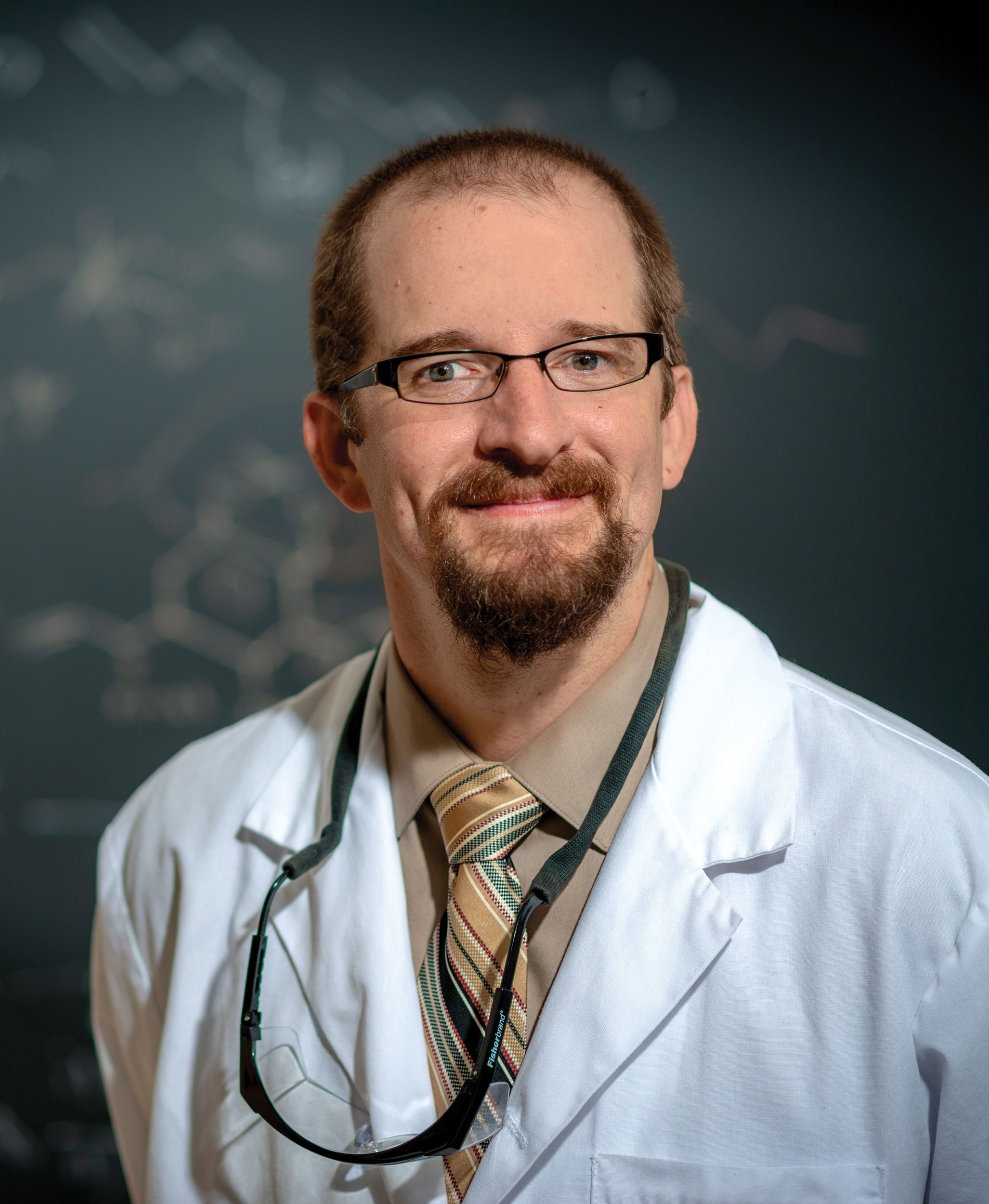
Associate Professor Mitchell Croatt is a rising star in the field of synthetic organic chemistry, designing and developing new reactions with a focus on medicinal applications. Over the last five years, the Department of Chemistry and Biochemistry head has published 20 papers and received over $815,000 from funders including the National Institutes of Health, the North Carolina Biotechnology Center, and the American Chemical Society. He is a recipient of the CAREER award, the National Science Foundation’s most prestigious grant for early-career faculty.
Better, stronger, faster
“In my lab, we do medicinal chemistry, tinker with new biofuels or compounds made from renewable sources, and more – but the overarching philosophy is to make molecules in fewer steps.
“For example, in a recent Stanford collaboration, we worked on a compound thought to have potential to reduce oxidative damage after a stroke. We cut the steps to produce it in half. And developed a method to produce several similar molecules in one or two additional steps.
“The fewer the steps, the less waste. More steps lengthen the time to make a compound, decrease chances a pharmaceutical company will be interested, and so on. We’re trying to make molecules more efficiently.”
Fine-tuning nature
“As part of UNCG’s Medicinal Chemistry Collaborative, I work with scholars on campus and at other universities, and industrial partners, to improve the ways we treat disease. Several of my studies, conducted with Dr. Nicholas Oberlies in our department, focus on optimizing naturally occurring compounds.
“Oberlies’ research group has isolated compounds from fungi that have anti-cancer properties. But fungi don’t really care about curing cancer in humans, so they haven’t exactly honed those compounds for anti-cancer activity. Our lab modifies those molecules to try to make better drugs.
“In one project, we created six fluorinated versions of a molecule currently used as an antifungal drug in humans and animals. By adding fluorine to that compound, which has also been reported to have anti-cancer effects, we make it harder for the body to metabolize. Imagine taking one pill a week instead of two pills a day. That’s the kind of thing we’re aiming for.
“In a different project, we selectively modified different functional groups of a very complex natural molecule, to understand which parts make it toxic – and to increase and decrease its toxicity.
“Another way we improve compounds is in collaboration with UNCG’s Dr. Patricia Reggio, who specializes in computational chemistry and computer-aided drug design. Her lab creates models that help us understand why a molecule, or a modification to a molecule, works the way it does.”
Going with the flow
“We were collaborating with Dr. Reggio – on creating molecules that more specifically target pain receptors – when we started to delve into flow chemistry. That has been an unexpected and fun avenue of work.
“Flow chemistry is a different way to do reactions. In your typical experiment, you add reagents to a flask, they react, you stop the reaction at a certain time, etc. In flow chemistry, you’re running reagents through tiny tubes and where they meet, they mix. The length of tubing where they interact is the reaction time length.
“There are major benefits. You can heat, cool, and pressurize reagents better and much more easily. It’s also safer. We have had to work behind a blast shield when we use explosive reagents, but if you do it with flow chemistry, the volume is so low that the tube will just pop if it explodes.
“Flow chemistry is very popular in the pharmaceutical industry, but our lab is one of just a few in the UNC System currently using it.
“We use a 3D printer and parts bought easily online to create our instruments, and we’ve developed an app to run them.
“We’re trying to make it accessible to more researchers. You can buy a flow syringe pump for around $10,000, or you can check out our lab’s YouTube videos and make your own for under $100. A lab in Germany has already built one of our systems. And a local biotech company is using one.”
Synthesizing new scientists
“The products of my research I am proudest of are the researchers themselves. I’ve mentored over 65 so far, including more than 40 undergraduates and 12 graduate students. It’s the part of the job I look forward to the most.
“I received the NSF CAREER award partly for my lab’s work on cyanocarbenes, which opened up a new pathway to assembling all sorts of molecules. The reaction we designed gave us access to a whole new area of research and landed us the cover of a top journal in organic chemistry. But the award also required a strong teaching component. It’s the teacher-scholar model.
“For me, UNCG offers the perfect balance of teaching and research. We have great students and the research infrastructure to do great things. We’re competing with the top universities for all these grants, and we’re getting them – so we’re really doing cutting-edge research with our students.
“Being able to position these students for success has been fantastic. I wouldn’t be where I am if not for my mentors, and it’s great to pay that back. I pursue diverse research projects because I want my students to be thinking about the different ways organic chemistry can impact projects and society in general. We want to help out humanity.”